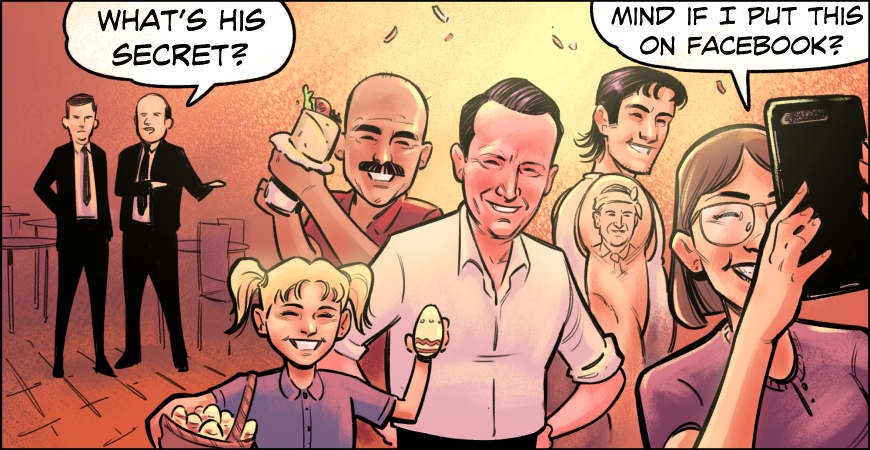What makes a politician popular on Facebook? To the untrained eye, it might not make sense that Premier Mark McGowan has 100,000 more Facebook followers than Queensland Premier, Annastacia Palaszczuk, who represents a state twice as populous as Western Australia. But dig a little deeper, and you will find there is some method to the political popularity madness.
The recent WA state election saw Facebook used to an extent that it had not been seen before in West Australian politics. It would be easy to focus on the money spent on Facebook advertising given that between just Premier Mark McGowan and Zak Kirkup’s campaigns, more than $130,000 was spent on Facebook election advertising.
However, throwing money at a digital campaign does not guarantee its success. Rather, campaign success on Facebook relies heavily on a candidate’s presence and persona built outside the campaigning dates and, most importantly, their ability to find the line between the two.
So let me take you behind the scenes on what makes a successful political profile in the digital world.
First, what does Facebook itself say about what makes a successful political profile on their platform?
- Be themselves. High-performing profiles are often those that understand what their own personal attributes are and are not shy in promoting them to their audience. However, they also ensure that their tone is consistent.
- Be authentic. Politicians and candidates should bring their audience behind the scenes, showing or explaining things their followers would otherwise not easily know or understand.
- Be engaging. Make sure a relationship is built between the politician and their audience. In short, what is being said is what the audience needs or wants to hear.
While this information seems simple and logical, finding the balance between being both authentic and engaging, while still being yourself is far more difficult than it appears.
Take our current WA Premier, whose Facebook presence is clear and engaging, yet still shows a personal side. What can be learnt from Mark McGowan’s overall popularity through the prism of Facebook?
Let’s look at some of the key areas that Facebook has identified as important and see how our Premier stacks up.
Be themselves:
I believe that this is Premier McGowan’s social media strength. One thing that is immediately noticeable to me when looking at his Facebook is that his tone is consistent. It is consistent with what he says in press conferences and also on his other social media platforms.
This consistency does not mean that his message and delivery is the same under all circumstances. Rather, there is consistency within each tone of voice, meaning a joke about April Fool’s or kebabs will have the same tone of voice, while an update regarding interstate borders or discussing a snap lockdown will be treated with tonal gravity.
This consistency is impressive given that most politicians do not write their own social media posts. The Premier’s staff appear to have a clear and comprehensive understanding of when each tone of voice should be used and is delivering them effectively.
Be authentic:
Creating authentic posts that bring followers behind the scenes or break down comprehensive news is also something Premier McGowan has done well over the past year.
The Premier’s authenticity, I believe, was best seen in the last year when communicating with West Australians about the Clive Palmer court case. This was a complicated issue that had the ability to be spun purely through a political lens, but Premier McGowan brought his followers behind the scenes in a different way, explaining the complexities while also providing reassurance.
Be engaging:
So, how does one create content that is authentic, and shows a part of themselves, while also being engaging? The answer is trust. Trust and time.
By being authentic and not shying away from taking followers behind the scenes, followers often begin to feel that they know the politician and that posts are being written with them in mind.
This trust assists in building the correct level of importance for each post, providing gravity to serious topics, while giving licence for followers to have fun with posts that encourage it.
This might be how Premier McGowan’s post announcing seven months of no community transmission in November 2020 had the same number of likes as his recent post announcing new state emblems for April Fool’s.
There are examples everywhere of political figures, domestically and internationally, who have managed to build that level of trust with their audiences in their own unique way. For example, New Zealand Prime Minister Jacinta Ardern does this by showing herself in a personable way, often jumping on a Facebook live to answer questions from everyday New Zealanders.
So, what do I suggest for politicians trying to find their way on Facebook?
They should ask themselves if they think their followers trust them and their message. If the answer is no, perhaps peeling back the curtain to show authenticity and not just a polished finished product might be the way forward.
 ReGen Strategic
ReGen Strategic